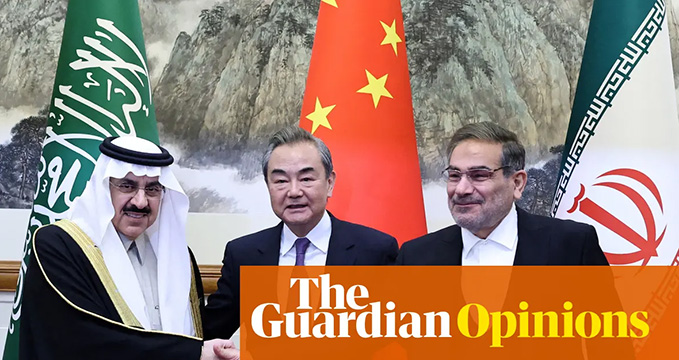
“Perhaps the first major diplomatic example of a post-America Middle East,” wrote one analyst, whose words ‘The Guardian’ editorial cites. This analyst was describing Iran and Saudi Arabia’s agreement last week to resume diplomatic relations – a surprise to most observers, and something of a coup for China, which brokered it.
The volatile rivalry between the two nations has been one of the great geopolitical faultlines since the Iranian revolution of 1979. Security concerns, claims to regional leadership, ethno-sectarian rivalries and other factors have all played their part. The repercussions have been profound.
The tensions contributed to Iran’s all-out support for the Syrian regime, fuelled the war in Yemen, where more than 150,000 have died, and accelerated the disintegration of the state in Lebanon.
Ties were cut in 2016 when Iranian protesters stormed Saudi diplomatic missions over Riyadh’s execution of a revered Shia cleric.
But while last week’s announcement was welcome, it is only a beginning. Assuming the deal goes ahead – there are two months for details to be ironed out – the containment of Saudi-Iranian tensions will not necessarily lead to a deeper rapprochement, let alone end Lebanon’s woes or the complex and multifaceted conflict in Yemen.
Talks between Riyadh and Tehran had been taking place since at least 2021. In 2019, an attack on a major oil facility that briefly knocked out half the kingdom’s output intensified security fears. The huge cost and reputational damage of the Saudi intervention in Yemen (in support of the internationally recognised government) gave an initially gung-ho Riyadh pause too. Driving through Crown Prince Mohammed bin Salman’s economic “Vision 2030” will require vast foreign investment.
And amid concern that the kingdom can no longer count on unstinting support from the US, preoccupied with Ukraine and tilting to the Indo-Pacific, this was a reminder to the Biden administration that Riyadh has other friends.
For Iran, the benefits are obvious: a first step out of political and economic isolation. It also blames Saudi-funded media for encouraging anti-government protests and wants broadcasts reined in. Meanwhile, China has positioned itself as an alternative to a withering US-led order and as a responsible peacemaker, offering a riposte to criticism for its support for Russia. In truth, Iran and Oman laid the groundwork, and China has brought willing parties together, rather than having to bang heads.
Nonetheless, it was Beijing that got the agreement over the line. It enjoys a long partnership with Tehran, but is also Riyadh’s biggest trading partner. In contrast, US dealings with Iran have been worse than ever since the Trump administration withdrew from the JCPoA nuclear deal.
Until now, China has focused primarily on trade and economic interests in the Middle East. Now those interests are making it think more broadly about regional stability. It reportedly plans to host a major summit for Iran and Gulf monarchies this year. But as it becomes more enmeshed, it may find it harder to maintain its neutral status. Its involvement could also pave the way for a new era of diplomacy in which democracy and human rights don’t even get lip service.
Who really wins from this deal remains to be seen, but authoritarian leaders could benefit more than the ordinary people whose lives have been damaged by the rivalry.
read more in our Telegram-channel https://t.me/The_International_Affairs

 10:29 18.03.2023 •
10:29 18.03.2023 •






















